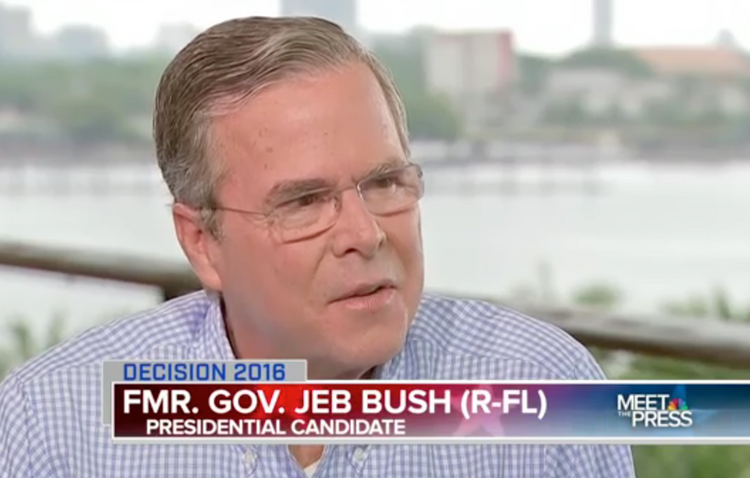On “Meet the Press” this past weekend, Jeb Bush said he was “conflicted” over the death penalty, even after allowing 21 executions during his tenure as governor of Florida. “It’s hard for me, as a human being, to sign the death warrant, to be honest with you,” the presidential candidate told interviewer Chuck Todd. “I'm informed by my faith in many things, and this is one of them.” Mr. Bush converted to Catholicism some twenty years ago.
Mr. Bush’s comments may not help him among GOP primary voters (his compassion toward those who immigrate to the U.S. illegally as an “act of love” for one’s family earned him the ridicule of rival Donald Trump), but they reflect a softening of support for capital punishment among political conservatives. The deep red state of Nebraska abolished the death penalty this summer, joining five other states that have taken the same action over the past decade. And last month, the National Association of Evangelicals passed a resolution that reversed its unqualified support for the death penalty and “Mosaic law,” citing among other reasons the “258 wrongfully convicted people [on death row who] have been exonerated due to the introduction of DNA evidence.” The N.A.E. resolution begins with a (Francis-like?) recognition of debate in good faith: “Evangelical Christians differ in their beliefs about capital punishment, often citing strong biblical and theological reasons either for the just character of the death penalty in extreme cases or for the sacredness of all life, including the lives of those who perpetrate serious crimes and yet have the potential for repentance and reformation. We affirm the conscientious commitment of both streams of Christian ethical thought.”
The new ambivalence over the death penalty reflects both conscience and more practical considerations. As the N.A.E. noted, there is growing concern over the criminal-justice system’s ability to determine guilt. Another factor is the increasing cost of applying the death penalty, given the legal appeals and other imperfect safeguards against executing people for crimes they did not commit. Mr. Bush alluded to the cost factor in his “Meet the Press” interview: “It is not a deterrent anymore because it’s seldom used…. It clogs up the courts, it costs a ton of money.”
The Atlantic’s Robert P. Jones notes that demographics are also eroding support for the death penalty. In explaining the N.A.E.’s change in tone, he writes, “The demographic data unequivocally point to an evangelical future that is less white, comparably African American, and more Hispanic,” and the latter two groups view the death penalty far less favorably. (A 2014 Pew Research Center report found this to be true overall and found a similar difference among Catholics, with 59 percent of non-Hispanic whites in favor of the death penalty and only 37 percent of Hispanic Catholics in favor.)
Jones argues that this is what makes the N.A.E.’s mention of “racial disparities” in death-penalty sentencing so significant: “Evangelicals have tended to see racism as a problem of disordered personal relationships rather than disordered institutions and laws, and they often dismiss out of hand sociological or structural explanations of social problems. But the new N.A.E. resolution has departed from this pattern…calling for the elimination of ‘racial and socio-economic inequities in law enforcement, prosecution and sentencing of defendants.’” (The U.S. Conference of Catholic Bishops has consistently opposed the death penalty without emphasizing the imperfections of the criminal-justice system, writing in July, “Catholic opposition to the death penalty…is rooted in mercy. It is also eminently pro-life, as it affords every opportunity for conversion, even of the hardened sinner.”)
The new ambivalence about the death penalty may not lead to its rollback in the 31 states that still use it. While state legislators in safe seats may be emboldened to question the cost and the arbitrary application of the death penalty, candidates for national and statewide office are less likely to defy public opinion. Hillary Clinton, the presumptive Democratic nominee for president next year, recently criticized capital punishment as being “too frequently applied, and too often in a discriminatory way.” But she immediately backed away from the implications of her comments, saying, “I do not favor abolishing it, however, because I do think there are certain egregious cases that still deserve the consideration of the death penalty.”
As for Mr. Bush, on “Meet the Press,” he justified his continued support for the death penalty by saying, “You meet family members that have lost a loved one and it’s still in their heart. It’s etched in their soul. And this is the way that they get closure? I get more comfortable with it, to be honest with you.” He also said “the first obligation of the state” is that victims of crimes “feel as though they are being served.”
The problem with that rationale is that victims are not all of one mind or conscience. The loved ones of many murder victims oppose the death penalty, including the parents of victims of the Boston Marathon bombings and the bombing of the Oklahoma City federal building in 1995. CNN once headlined a story about such family members by referring them to the “Death Penalty’s Unlikely Opponents.” It would certainly be unjust if the death penalty were imposed only when surviving family members approved the punishment for the purpose of “closure.” Mr. Bush is only bringing us back to the arbitrary nature of the death penalty, which is why it’s certain to come up again as a campaign topic despite many candidates’ discomfort with it.








